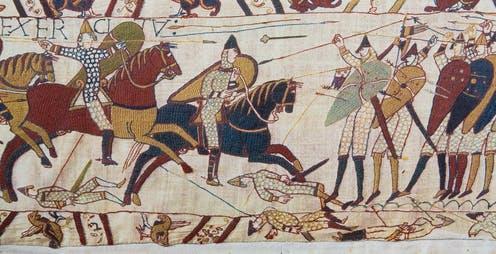
4 minute read
Karel Ohana Méfiez vous des faux amis
Plus de 10,000 mots en anglais viennent de la langue française. Il est estimé que 29 pour cent de la langue anglaise est composée de mots français purs.
Ceci peut être attribué à l’invasion des Romains autour de 50 av. J.-C. Après cela, ‘Britannica’ fit partie de l’empire romain, et donc le latin devint la langue de la vie politique et administrative.
Advertisement
Autour des 5eme et 6eme siècles, certaines tribus Germaniques - dont les Saxons- ont envahi la Bretagne, en apportant leurs langues avec eux. Néanmoins, le latin resta puisque c’etait la langue de l’Église catholique.
Effectivement, toutes les cérémonies religieuses avaient lieu en latin. Ceci mena à l’infiltration des mots utilisés en prière dans la langue anglaise usuelle. Le français est une forme vulgarisée du latin, alors on retrouve ces racines latines dans les mots anglais comme “devil” (Latin : diabolus) et “angel” (Latin : angelus).
Cela dit, la raison principale pour l’abondance de mots français utilisé en anglais date de l’invasion des Normands en 1066, quand Guillaume le Conquérant (William the Conqueror) a gagné le trône britannique dans la bataille de Hastings. Après son ascension, la cour royale fut composée de nobles normands, qui parlaient français.
Ainsi l’ancien anglais et l’ancien français coexistèrent, puisque la majorité des Bretons n’avaient pas de contacts avec la noblesse. Au fur et à mesure du temps, les mots français ont encore été utilisés dans la langue anglaise.
Les secteurs principaux dans lesquels on peut observer cela sont le droit, l’administratif, et la nourriture. Par exemple, les mots sovereign (souverain), justice (justice), and counsel (conseil). Cependant les mots “pig” and “sheep” ont des racines Germaniques alors que, en tant que nourriture, ils deviennent “pork” (porc) and “mutton” (mouton) – et proviennent donc du français.
Il est aussi intéressant de noter que les mots français contenant un accent circonflexe, avaient en fait un ‘s’ à leur origine. Par exemple, le mot, château été originellement chasteau, et forêt était forest. C’était le cas quand les mots en Français étaient empruntés à la langue anglaise, alors plusieurs mots contenant un accent circonflexe ont des homologues anglais.
Mais faites attention ; il ne faut pas se laisser piéger ; il y a, comme toujours, plusieurs exceptions ! Ci-dessous quelques exemples.
Le mot « Library » en anglais veut dire une bibliothèque. Alors qu’en français une librairie correspond à un « bookshop ».
Il y a aussi ce problème avec le mot « Sensible ». Lorsqu’en anglais une personne qui se comporte « sensibly » est une personne sage ou raisonnable, en français le mot « sensible » correspond à « sensitive » en anglais. Cet exemple démontre parfaitement les périls d’une trop forte dépendance à « Google translate » vu que cette nuance sensible ne passe pas à travers le logiciel.
Également avec le mot « eventually ». En anglais ceci veut dire « au final », alors que « éventuellement » indique une potentialité en français ; on le traduirait plutôt par « perhaps ».
Ces trois exemples démontrent bien l’importance des linguistes pour éviter la confusion, préserver l’intégrité des textes clés, et honorer notre histoire partagée.

Be wary of false friends!
More than 10,000 words in English come from the French language. It is estimated that 29 percent of the English language is made up of pure French words.
This can be attributed to the Roman invasion in around 50 AD. After that, ‘Britannia’ became part of the Roman Empire; thus, Latin became the language of political and administrative life.
Around the 5th and 6th centuries, Germanic tribes – including the Saxons - invaded Britain, bringing their language along with them. Nevertheless, Latin remained prominent as the language of the Catholic Church.
Indeed, all religious ceremonies took place in Latin. This led to the infiltration of words used in prayer into daily English language. Since French is a popularized form of Latin, we find these Latin roots in English words like “devil” (Latin: diabolus) and “angel” (Latin: angelus).
However, the main reason for the abundance of French words used in English dates back to the Norman invasion of 1066. After William the Conqueror won the British throne in the Battle of Hastings, the royal court was mainly composed of Norman nobility, who spoke French.
Thus, Old English and French coexisted, since the majority of Britons had no contact with the nobility. Over time though, French words have further infiltrated into the English language. The main areas in which this can be identified are law, administration, and food. For example, the words sovereign, justice, and counsel. Whilst the words “pig” and “sheep” have Germanic roots, their food forms “pork” (porc) and “mutton” (muton) - come from French.
It is also interesting to note that French words containing a circumflex accent originally contained an ‘s’. For example, the word chateau was originally chasteau, and forest was forest. This is because French words were borrowed into the English language, hence many words containing a circumflex accent have their English counterparts.
But be careful; do not let these similarities lead to translation pitfalls! There are, as ever, several exceptions. Below are some examples.
The word "bibliothèque" in English means a library, where in French “une librairie” is a bookshop.
This problem also arises with the word "Sensitive". While in English a person who behaves "sensibly" is a wise or reasonable person, in French the word sensible corresponds to "sensitive" in English. This example perfectly demonstrates the perils of an overdependence on "Google translate”; this sensitive nuance does not pass through the software!
Likewise, with the word "eventually". In English this means "in the end", while the French “éventuellement" indicates a potentiality, this would be translated as "perhaps".
These three examples clearly demonstrate the importance of linguists in preventing confusion, preserving the integrity of key texts, and honouring our shared history.










